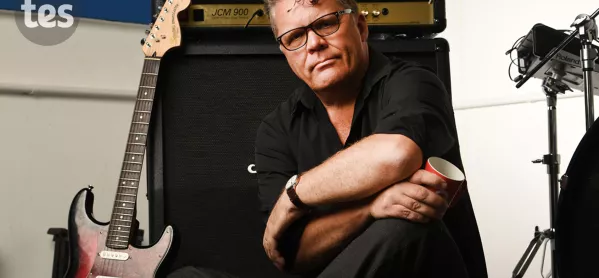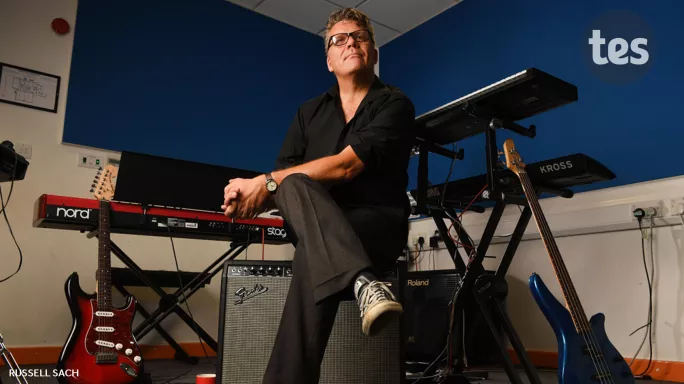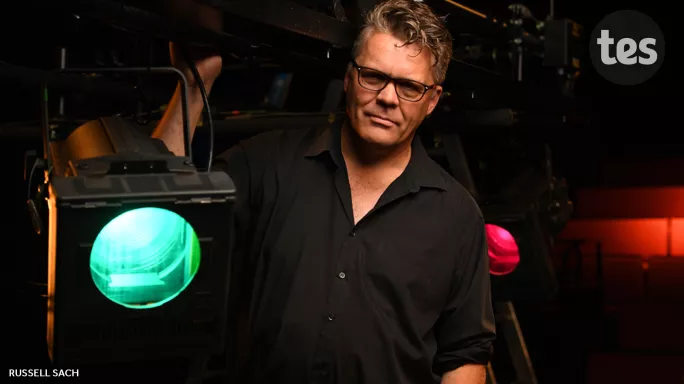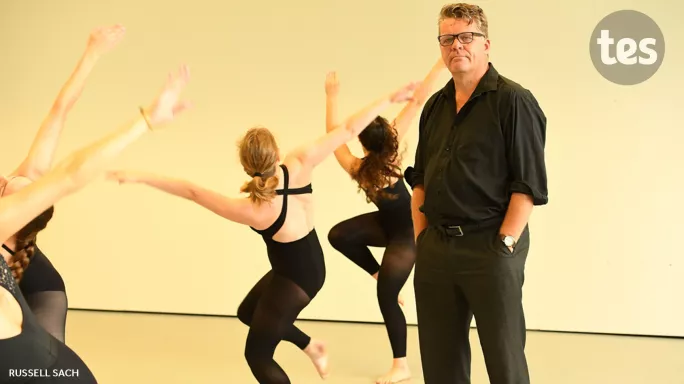- Home
- Profile: The fame school head who fears for the future
Profile: The fame school head who fears for the future

“I’d rather people didn’t say: ‘It’s not rocket science’. I’d rather they said: ‘It’s not contemporary dance’.”
For Stuart Worden, principal of The BRIT School - the state-funded “fame school” in Croydon - there is no such thing as a “soft” subject.
In fact, the former theatre director, who is this year celebrating his 25th anniversary at the world-renowned performing arts and technology secondary, believes the whole concept of a “hierarchy of subjects” is flawed - and the creative industry is crying out for a change in priorities.
New priorities: Tech revolution ‘could make arts more important than maths’
Viewpoint: ‘Dear PM... Don’t forget the creative subjects’
From the magazine: A day in the life of…a BRIT School teacher
“To call it a soft subject - it almost implies that it’s not as hard,” he says.
“This idea of being academic and not [being academic], I just don’t understand. And I think employers are telling us that.
“I don’t want this country left behind by not producing the filmmakers, the television producers, the prop makers, the set designers, that the industry is crying out for.”
It is no secret that Worden, 53, is a firm believer in the creative industry as both a prolific employer and a force for good.
He is proud that The BRIT School has a certain “star factor”, with world-famous alumni including Amy Winehouse, Katie Melua, Adele, Tom Holland, Rizzle Kicks and Loyle Carner. But he really comes alive when speaking about his pupils’ work in the community - using their talent to engage with young children, the elderly and terminally ill people, who may benefit from a creative outlet.
“If you want to be a rock star, but yet you’re sitting down with someone who knows they’re going to die in three months’ time, and you’re going: ‘OK, well let’s write a song together’, that just changes who you are and how you feel about the world,” he says.
Balancing teaching and fundraising
But while he considers himself an optimist, Worden is under no illusion about the pressures facing state schools today.
“I look at my job title these days, and I think I am a principal fundraiser,” he says.
“I am not sure how I feel about that. I kind of wish I didn’t have to do it, because I have a school to run.”
It is certainly very different to headteachers’ priorities when he was growing up 50 years ago.
Raised in Chichester, Sussex, Worden liked school very much - in fact, he “loved everything about it”.

He was born in 1966 to Bill, a bricklayer, and Sylvia, who didn’t work while he was young.
Both parents later trained as teachers; Bill taught bricklaying and Sylvia, who took her O levels in her thirties, worked in a primary school.
“They are the reason I am here, in lots of ways,” Worden says.
He was first drawn to the theatre as a young boy, when at the age of 5 or 6 he joined his mum for a trip to see Shakespeare’s Othello at the end of his road.
“I got the bug really from that,” he says.
“From a very early age I was watching Chekov and Ibsen, and just connecting with that world.”
From school assemblies to the bright lights
Brought up in a working-class household, Worden attended Jessie Younghusband Primary School, just a stone’s throw from his family home, and later Chichester High School for Boys, a local comprehensive.
He was a talented rugby player and flourished in English and history, but it was the stage that stole his heart - and by the age of 12 he was writing plays to perform to his peers during the morning assemblies.
As his sixth form didn’t offer a course in theatre, Worden transferred to Chichester College - where he says “the world just opened up”.
“That’s where it all really exploded,” he says.
“I had an incredibly inspiring drama teacher who was radical and brave. We were doing extraordinarily ambitious pieces of theatre. It was just the best time ever.”
After spending three years studying theatre and film at the Polytechnic of North London (PNL) in the late 1980s, Worden started seeking work as an intern - a period he refers to as his “wilderness years”.
He realised that, while he was sharper academically, he hadn’t gained a great deal of employable skills, and so headed to Sheffield to study for a master’s degree in film and theatre.
There he met his biggest inspiration, a technician called Duncan Law, who dedicated himself to helping the students realise their creative visions.
Post-graduation, Worden moved to London, formed a theatre company called The Steam Factory (later The Steam Industry), and had “the three most glorious years of putting on theatre”.
‘We may not exist in 10 years’
It was in 1994 that he took on his first teaching job at The BRIT School.

“My view at the moment is that maybe the education landscape isn’t fully celebrating the full neurology of a young person, and therefore I think there might be a neglect of what makes a human,” he says.
“I’ve heard from other schools that the school plays go early, because they’re costly, and we can probably live without that trip to the dance show.
“So then what happens, of course, is an elite creation of art, based on those that can afford, rather than those who just have a passion.”
But even The BRIT School, famous for its dedication to the creative subjects, has not escaped the hardship of recent years.
Worden says he has dealt with a funding shortfall of £1 million per year since government cuts to post-16 education hit in 2012, and he spends 30 to 40 per cent of his time working through the budget and seeking sponsorships.
“This budget problem for schools, and The BRIT School in particular, is not sustainable,” he says.
“People will start walking away from working in schools because they’ll say: ‘This is actually just too hard’. I just think it’s pretty tiring working in schools at the moment.”
Asked where The BRIT School will be in a decade if things don’t change, Worden does not pull his punches.
“Well, we wouldn’t be able to exist unless private funding really came on,” he says. “There’s no obligation for the private world to sponsor the state education system. And we’re not a private school where that is part of the culture.
“The beauty of The BRIT School, of course, is that it’s free. No one pays to come here.”
The arts as a form of therapy?
He also believes that a greater focus on creative subjects may help tackle the current mental health crisis.
“Most young people aren’t very good at talking. So write a song about it, or create a piece of dance about it,” he says.
“I’m not being flippant - I think there is something very powerful about using the arts to talk about where you’re at.
“If you’re a young man thinking: ‘Oh, how do I feel about my life and my way of life’, you may listen to Loyle Carner. We have always used the arts to understand the world, and I think not having that in the curriculum as a major focus denies a young person a place to come to terms with themselves or the world.
“I just hope that there is access and suitable funding for all young people to have the opportunity to do art at the highest level.”

“I’ve never really minded Ofsted - I think it’s a really interesting way of getting a review,” he says.
“What is very positive about this framework, I think, is the sense of the whole student - the person. I think that is powerful.”
He has huge admiration for his pupils’ dedication to their chosen career path - whether that be singing, dancing, prop making or games design. Despite all the glitz and glamour associated with the school’s famous alumni, he views all professions equally.
‘Uniform gets in the way’
Worden also has an objection to school uniform that seems indicative of his desire to foster creativity among the younger generation.
“I don’t understand it,” he says.
“I know there’s loads of arguments about discipline, but I think it gets in the way. This isn’t a fashion show here, and if it was, so what? That’s OK. When you’re growing up, you want to find who you are. Clothes do that. So why wait for the weekend?”
Looking to the future, Worden wants to invest more time in the school’s community work, diversify the courses on offer to reflect an ever-evolving industry, and continue to support pupils from all backgrounds - especially those who identify on the LGBT+ spectrum.
“When I started, I think the school was exciting and brave and queer, and not quite like a school, and no one knew who we were,” he says.
“Now we are kind of queer, and not quite like a school, and everyone knows who we are. It’s been extraordinary.”
CV: Stuart Worden
- Education: Jessie Younghusband Primary School; Chichester High School for Boys; Chichester College, Sussex
- 1985-88: degree in film and theatre at Polytechnic of North London (PNL)
- 1988-89: various intern jobs
- 1990-91: master’s degree in film and theatre at University of Sheffield
- 1991: Formed The Steam Industry theatre company
- 1994: Director of Theatre, The BRIT School
- 2012: Principal, The BRIT School
Keep reading for just £1 per month
You've reached your limit of free articles this month. Subscribe for £1 per month for three months and get:
- Unlimited access to all Tes magazine content
- Exclusive subscriber-only stories
- Award-winning email newsletters



